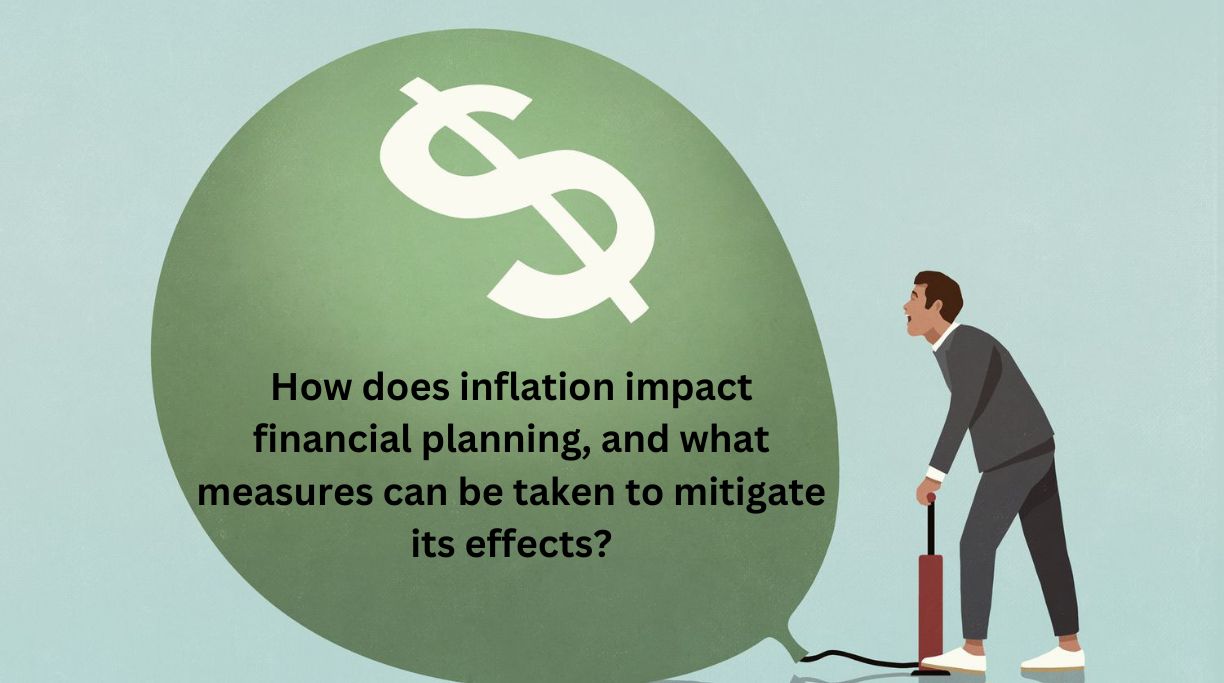The consistent increase in the average cost of goods and services, or inflation, is a crucial element that can have a big influence on financial planning. Anyone looking to secure their financial future must comprehend its workings and put effective measures in place. Let’s examine methods to lessen the effects of inflation and delve into its complexities.
How Inflation Erodes Purchasing Power?
A phenomenon related to money known as inflation gradually reduces the buying power of money over time. Although its workings are seemingly straightforward, they have significant effects on both people and economies. Each unit of currency becomes less valuable as prices for goods and services rise. This erosion affects a wide range of industries, from big investments to everyday necessities. Assume for the moment that the rate of inflation is 3%. In a year, a loaf of bread that costs $1 today would cost $1.03 due to inflation of 3%. In the short run, this might not seem like much, but over time, the compounding effect shows. As a result, less goods and services can be purchased with the same amount of money, which lowers real purchasing power.
How Inflation’s Effect on Savings?
Effect on financial savings
Cash savings are significantly impacted by inflation, which gradually reduces the real value of money over time. The purchasing power of money saved decreases as prices rise. For example, if a person saves $1,000 and inflation is 2% annually, after a year the real value of that $1,000 would be $20 less. When depreciation increases, people who depend on their cash reserves for unexpected expenses or short-term objectives face difficulties. In order to counteract this effect, astute financial planning entails investigating alternative investments or strategies that surpass inflation, guaranteeing the preservation of savings’ actual value.
Impact on long-term investments and savings
Long-term investments and savings are greatly impacted by inflation, creating a dual challenge of maintaining and increasing wealth. The real value of money saved for the future decreases as prices rise. This puts savings for schooling, retirement, and other long-term objectives at risk. Over time, these savings lose purchasing power if they are not invested at a rate higher than inflation. It is therefore essential to make strategic investments in assets that have historically outperformed inflation, such as stocks or real estate. Financial success over the long run depends on taking a proactive stance and accounting for how inflation affects investment growth and sustainability.
Read Also:
- What are the benefits and drawbacks of different retirement account types, such as 401(k)s and IRAs?
- What strategies can be employed to pay off high-interest debts efficiently?
- How does one assess their risk tolerance and align it with their investment strategy?
How To Adjust Budgets in Inflationary Times?
Techniques for modifying individual budgets
Strategic planning is necessary when adjusting personal budgets to account for inflation. People can use a number of practical tactics to lessen the effect on their financial security. First, to account for growing expenses, review and modify the budget on a regular basis. Set aside money for necessities first and look for ways to reduce discretionary spending. Adopt a proactive attitude by spotting inflation patterns and making plans in advance. To improve your financial resilience, diversify your sources of income. Finding ways to cut costs, like buying in bulk or taking advantage of discounts, can also help you keep a balanced budget. People can deal with the effects of inflation while maintaining their financial stability and accomplishing their long-term objectives by being alert and adaptable.
Effective resource allocation
Financial stability depends critically on resource allocation that works in the face of inflation. Sort spending into necessities and non-necessities first, making sure that the most important needs come first. To offset the effects of rising prices, set aside a certain percentage of your income for investments and savings. Invest in a variety of assets to increase resilience. Evaluate and modify allocations on a regular basis in response to shifting economic conditions. In order to promote financial well-being over the long and short terms, efficient resource allocation entails finding a balance between short-term needs and long-term objectives. Through the implementation of a tactical methodology, individuals can effectively manage the obstacles posed by inflation and maximize the efficiency of their accessible resources.
What is Investing Strategies to Combat Inflation?
One essential tactic is diversification.
When it comes to mitigating the damaging effects of inflation, diversification is a critical tactic. Through diversifying their investments across different asset classes such as stocks, bonds, and real estate, individuals can reduce the risk associated with currency fluctuations. This methodical approach guarantees a reduction in the effect of inflation on any one investment. Additionally, diversification acts as a cushion against market volatility, fostering a portfolio that is more resilient and stable. In addition to protecting wealth during inflationary times, adopting this important tactic increases the likelihood of long-term financial stability and grow
particular assets that can serve as inflation hedges
Certain investments protect portfolios from inflation by acting as efficient hedges. Historically, during inflationary times, real assets like real estate and commodities like gold and silver have held their value. Treasury Inflation-Protected Securities (TIPS) guarantee that bondholders receive higher interest payments by making adjustments for inflation. Purchasing dividend-paying stocks can also be beneficial because dividends may be increased by companies in response to price increases. Infrastructure investments, such as utilities or energy stocks, also offer stability and room for expansion. Through the strategic integration of these inflation-resistant assets into a diversified portfolio, investors can strengthen their resilience against inflation and better safeguard their wealth.
What Is Real Assets as a Hedge?
The use of real estate as a hedge against inflation
Real estate’s special qualities make it a strong hedge against inflation. Real estate tends to appreciate in value as prices rise, protecting and possibly increasing wealth. Furthermore, rental income from real estate frequently exceeds inflation by offering a steady cash flow. Rental incomes and property values have historically shown resilience in periods of inflation. Whether through direct ownership or real estate investment trusts (REITs), real estate investing provides a concrete and dependable way for people to protect their assets from inflation’s corrosive effects, which promotes long-term financial stability and growth.
Other material possessions to think about
Other tangible assets, outside real estate, provide worthwhile substitutes for inflation hedges. A tangible store of wealth, precious metals like gold and silver have a history of holding their value during inflationary times and even increasing in value. Collectibles like rare coins or artwork can also be used as investments that are resistant to inflation. Investing in commodities such as energy resources or agricultural products also offers potential growth and diversification opportunities. Through the integration of various physical assets into an investment portfolio, individuals can fortify themselves against the debilitating effects of inflation, cultivating a comprehensive and sturdy financial plan.
How inflation affects the real cost of debt?
Because inflation reduces the purchasing power of money, it has a significant effect on the true cost of debt. Over time, the fixed amount borrowed loses value due to rising prices. In practical terms, this lessens the debt load. Paying back loans with less valuable currency, or essentially repaying a smaller amount in purchasing power, is advantageous to borrowers. Nonetheless, it’s critical to take into account how the interest rate will affect the final cost. Lenders may raise rates if interest rates do not keep up with inflation, which would reduce some of the real cost advantages. Comprehending this dynamic is essential for managing debt strategically in the face of inflation.
Conclusion
In conclusion, navigating the impact of inflation on financial planning requires a proactive and diversified approach. From adjusting budgets and strategically allocating resources to embracing diverse investments and considering real assets, individuals can safeguard their financial well-being. Understanding inflation’s influence on savings, investments, and debt is key to making informed decisions. Regular financial checkups, adaptation to global economic trends, and leveraging technological tools contribute to a resilient financial strategy. By implementing these measures, individuals can not only mitigate the effects of inflation but also position themselves for long-term financial success and stability.
FAQs
- Q: How does inflation impact my everyday expenses?
- A: Inflation leads to a rise in the prices of goods and services, impacting your purchasing power. Everyday expenses may increase, affecting your budget.
- Q: Can investing in real estate completely protect against inflation?
- A: While real estate is a robust hedge, it’s not foolproof. Factors like location and market conditions influence its performance.
- Q: Is diversification essential for everyone, regardless of their risk tolerance?
- A: Yes, diversification spreads risk, making it a crucial strategy for all investors, even those with varying risk tolerances.
- Q: How often should I review my financial plan to adapt to inflation?
- A: Regular reviews, at least annually, are advisable to ensure your financial plan aligns with evolving economic conditions, including inflation.
- Q: Are there government programs that specifically address inflation’s impact on individuals?
- A: Governments may implement measures during inflationary periods, but individual strategies, such as diversification, remain crucial for personal financial resilience.








